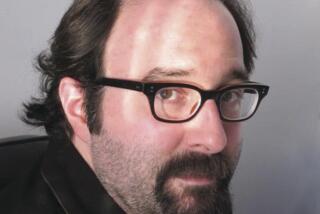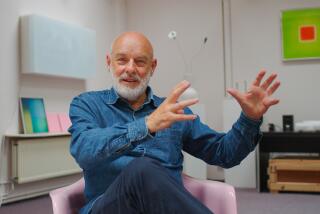Leaping forward
By Ed Park
Looking backward, briefly: It went unremarked that 2007 was the year when the weirdness of time dilation hit Sgt. William Mandella. Battling the far-flung Taurans meant interstellar travel via “collapsars” (black holes); two years of army service, kicking off with a one-sided slaughter on the bleak planet Charon, somehow translated into 10 years back on Earth. Prepping for his next mission, Mandella realized he would be eligible for retirement if he survived -- “a twenty-year veteran, and only twenty-five years old.”
All this happened, of course, in a parallel reality, the 2007 of Joe Haldeman’s “The Forever War” (Eos: 288 pp., $14.95 paper). Published serially in Analog and brought out by St. Martin’s in 1975, Haldeman’s first science-fiction novel is an awesome, career-defining feat, both a richly satisfying engagement with the genre’s tropes and one of the essential pop-culture reflections of the Vietnam War. On Charon, commanders use post-hypnotic suggestion to push their troops into murderous overdrive; a later engagement finds both sides resorting to low-tech weapons such as arrows, swords and bolos, a nightmarish regression reminiscent of the decaying vehicles in Philip K. Dick’s “Ubik.”
Aspiring to be an astronaut, Haldeman studied physics in college. Vietnam interfered. According to the “long autobiographical ramble” on his website, he was unable to get conscientious objector status, and since working for NASA would mean working for the government, he reluctantly chose the Army instead of “jail or Sweden.” Haldeman served for two years, receiving a Purple Heart after being badly injured in an explosion. On the strength of a short, non-sci-fi novel based on his military experience, he attended the Iowa Writers’ Workshop, where he finished “The Forever War,” “perhaps the only master’s thesis that’s won both the Nebula and Hugo Awards.” (He dedicated his strange 1976 novel “Mindbridge” to his teachers, who included Stanley Elkin, Raymond Carver and John Cheever.) Mandella’s voice is engaging and supple, recounting the horrors of war against a distant, ill-understood enemy, and the multiplying future shocks of a man whose brief but harrowing tours of duty literally age him beyond his years.
In the real 2007, Haldeman, who teaches writing at the Massachusetts Institute of Technology, published the delightfully diverting “The Accidental Time Machine” (Ace: 278 pp., $23.95). Next to “The Forever War,” it resembles something of a jeu d’esprit, but Haldeman briskly structures both novels around a headlong (and heady) approach to the future. Mandella’s career begins in 1995 and ends in 3143; accidental time-tourist Matt Fuller begins as a graduate researcher at MIT in 2058 and bounds rightward along the timeline in exponential intervals, until he’s hundreds of thousands of years away from anything resembling home.
Matt’s no hero at first, just a languishing academic who happens to notice something strange happening to the machine he tends. “All the calibrator was supposed to do was supply one reference photon per unit of time,” writes Haldeman. Instead, it disappears when a button is pushed. Graphing it out, Matt realizes that each push of the button causes the device to vanish 12 times longer than the previous push and reappear at correspondingly distant locations.
Although initially motivated by thoughts of fame and wealth, he realizes that moving forward in time is something everyone does anyway; it doesn’t mean anything unless you can get back. But scientific curiosity takes over as his primary motivation. The displacements are minute at first, and Matt uses a pet-store turtle, a stopwatch and a video camera to record these early dematerializations, as his personal life implodes. Before the seventh push -- which will move the calibrator and its captive 39.54 days into the future, Matt decides to play guinea pig himself, pressing the button inside a dope-dealing acquaintance’s ’56 Thunderbird. Thrown in jail by puzzled cops upon his return, suspected of murder, Matt gets bailed out by an unknown benefactor bearing a million-dollar check. Somebody in the future -- maybe himself -- needs his experiment to continue, and what follows is a series of blind forays forward in the hopes that some distant era will have the know-how to send him backward.
It’s a classic time-travel conceit, and Haldeman entertains us with Matt’s compounding chronological dilemmas and a wry awareness of the genre’s precedents in this field. “There was no Baedecker for the future,” Matt thinks, early in his voyages. “Science fiction had a really bad record, world peace and personal dirigibles.” Even as the proceedings get wilder -- far beyond what we in the early 21st century have experienced -- the tone is grounded in casual humor and plot-clarifying reason. Even a bar snack can provide a helpful model: “Each egg was a closed three-dimensional solid touching other closed three-dimensional solids, unaware that it was floating in a larger universe of vinegar.”
Haldeman is in comic and romantic mode in “The Accidental Time Machine.” Banter and wry observation dominate; a National Geographic, circa 2072, still has its trademark mundane lineup: “The clam farms of Samoa. Our friend the Dung Beetle. Surprising Pittsburgh.” Venturing a couple thousand years forward, Matt makes his way through an antiquated, religion-dominated Cambridge, only to find that his alma mater and employer is now called the Massachusetts Institute of Theosophy. (“Technology” is verboten.) Through a network quirk, he’s still listed as faculty, and after learning to use “what passed for a word processor in this place and time” (pen nibs, stuck in a potato to prevent rust), he experiences the epitome of delayed gratification with his comely but naive graduate assistant, Martha.
Another future finds Martha and Matt in a perfect consumer society, in which New Mexico has been annexed to Los Angeles, everything is up for instantaneous virtual auction, and “there aren’t any jobs, as such, for anyone.” The spirit of Los Angeles turns out to be a disembodied entity known as La, herself a time-traveler of a more self-destructive bent; and things get stranger still. “The Accidental Time Machine” doesn’t have the experimental chutzpah of “Mindbridge” (a novel whose spurts of simultaneous two-column narration, recording the thoughts of a couple having sex while clutching the titular alien life form, occasionally recall John Barth’s “The Floating Opera”), and its social commentary registers laughter more than outrage.
The snug, lovely ending rewards the reader’s time, and Haldeman’s concluding scientific postscript is an even lovelier meditation on how books gain new and unexpected resonance over the years. I first read “The Forever War” as a teenager, floored by its violence and somewhat immune to the storybook procreation ending. This time around, I found the conclusion almost unbearably touching, a foretaste of “Love in the Time of Cholera’s” last line. (No coincidence, perhaps, that clock-hopping Matt buys a García Márquez letter as an investment.) I reread “The Forever War” in a hospital last week, as I waited for my son to be born. As Haldeman writes: “Everybody does travel through time toward the future, trivially, one second at a time.”
Ed Park is an editor of the Believer. His Astral Weeks column appears monthly, and his novel “Personal Days” is forthcoming from Random House.
More to Read
Sign up for The Wild
We’ll help you find the best places to hike, bike and run, as well as the perfect silent spots for meditation and yoga.
You may occasionally receive promotional content from the Los Angeles Times.










